Key takeaways:
- Emergency funds provide financial security and peace of mind during unexpected challenges, allowing for focused decision-making in crises.
- Aim for three to six months’ worth of living expenses in your emergency fund, and keep it in a separate, accessible savings account.
- Consistent small savings accumulate over time, transforming financial security and reducing anxiety about unplanned expenses.
- Regularly review and adjust your emergency fund contributions to ensure it meets your current lifestyle needs and financial resilience.
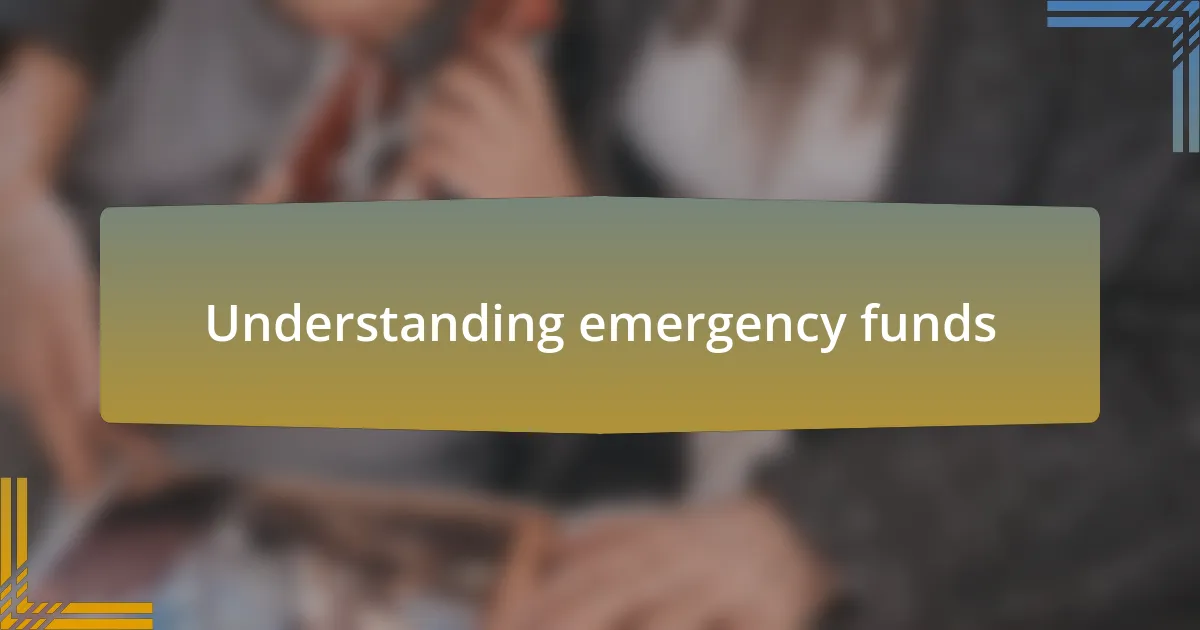
Understanding emergency funds
Emergency funds are essential for navigating unexpected financial challenges, providing a safety net that offers peace of mind. I remember a time when my car broke down unexpectedly, and having that fund allowed me to address the situation without stress. It’s fascinating how knowing you have set aside resources can completely change your outlook during a crisis, don’t you think?
The idea is not just about having money saved up, but about fostering a sense of security in your life. I often reflect on how many of us may shy away from having these discussions, believing that emergencies won’t happen to us. But the reality is that life can be unpredictable, and an emergency fund can help cushion those surprises.
Building your emergency fund can feel daunting, especially if you’re starting from scratch. I once decided to set aside a small portion of my income each month; it transformed my financial position over time. Have you ever thought about how small, consistent actions can lead to significant outcomes? It’s about creating a habit of saving—something that can serve as a foundation for your financial health.
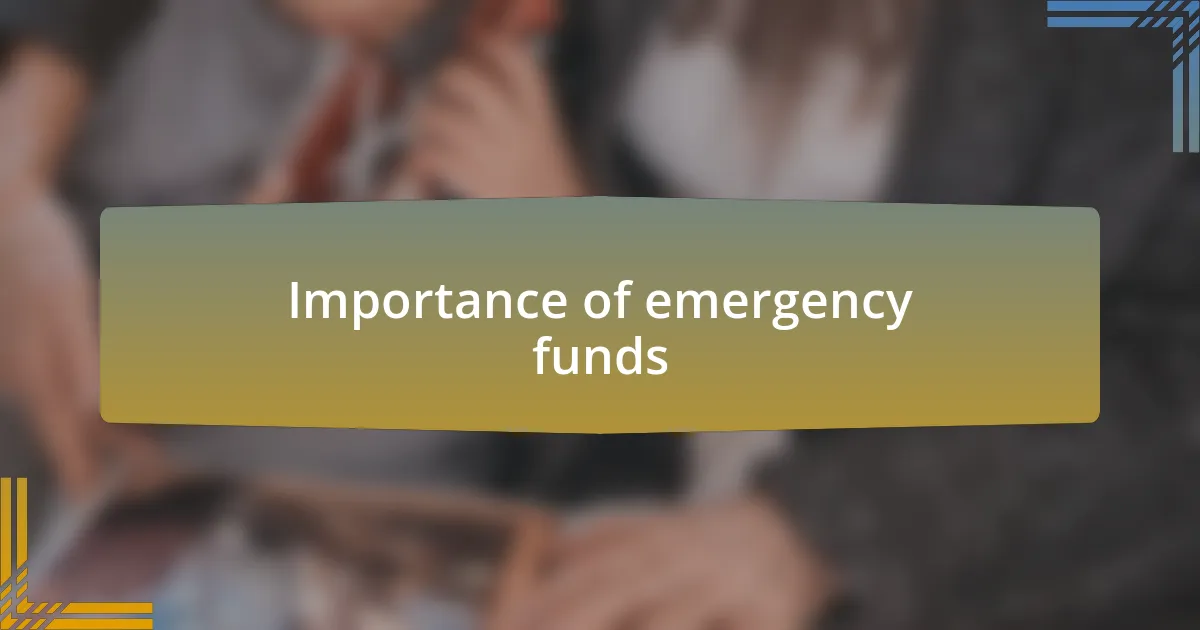
Importance of emergency funds
Emergency funds play a pivotal role in enhancing our financial resilience during unforeseen situations. I still recall a colleague facing sudden medical expenses; her well-planned emergency fund made all the difference in reducing anxiety and allowing her to focus on recovery without financial distraction. Can you imagine navigating a health crisis without that reassurance?
Having an emergency fund fosters a proactive mindset, empowering you rather than leaving you at the mercy of life’s unpredictability. When I experienced a sudden job loss, my fund allowed me not just to cover bills but to take my time finding the right opportunity rather than settling for any job just to make ends meet. Isn’t it comforting to know that you can handle whatever life throws your way?
In my perspective, an emergency fund is not merely savings—it’s a commitment to your well-being and stability. I once met a gentleman who shared how setting aside just a few dollars each week turned his anxiety into confidence over time. How might your life change if you approached emergencies with such a safety net in place?
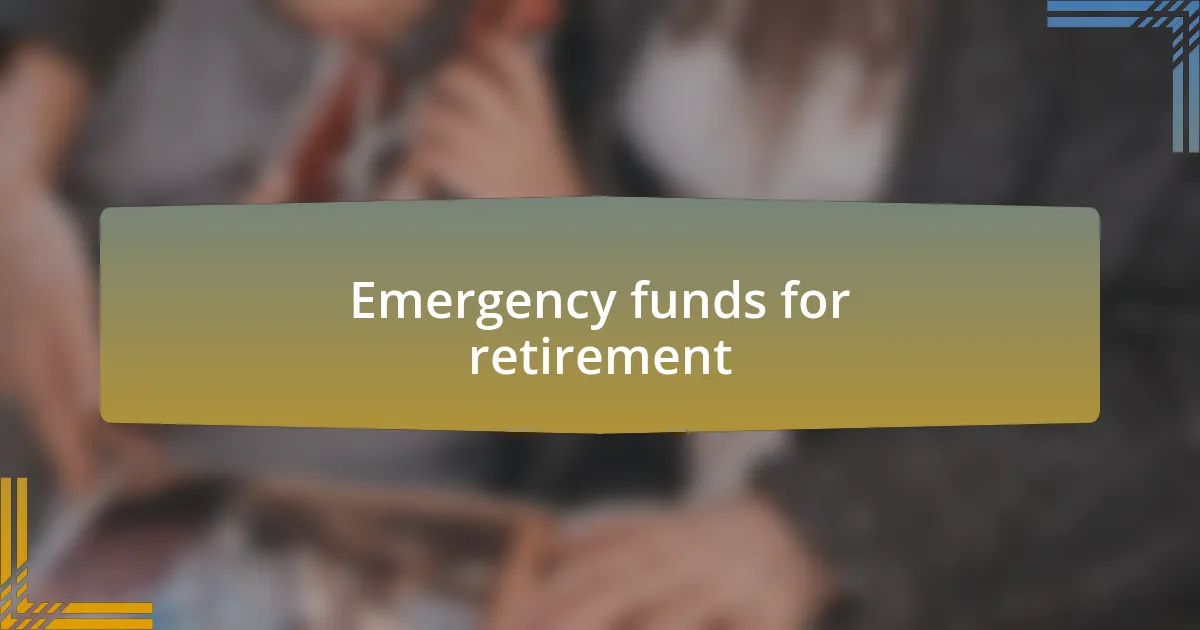
Emergency funds for retirement
Emergency funds for retirement are essential not just for unexpected expenses, but also for maintaining your peace of mind. I once spoke with a retiree who found himself facing significant home repairs. His emergency fund allowed him to address these urgent repairs without derailing his retirement lifestyle. Wouldn’t it be wonderful to tackle unexpected challenges without the financial stress?
In planning for retirement, I believe having at least three to six months’ worth of expenses tucked away makes a world of difference. I recall when a friend’s car broke down unexpectedly, costing him a hefty sum. Having the right amount set aside meant he could get back on the road without hesitation. How empowering would it feel to know you’re prepared for any twist life throws your way?
It’s eye-opening to consider how an emergency fund can transform your retirement experience. I’ve seen individuals who approach this phase of life with trepidation because of financial uncertainties. When they finally establish a solid fund, it changes their outlook entirely. Are you ready to take that step toward a more confident and secure retirement?

Luxury retirement home considerations
When thinking about a luxury retirement home, location plays a crucial role. I once visited a stunning facility nestled by the coast, and the serene views were simply breathtaking. Imagine waking up to the sound of waves rather than city traffic—wouldn’t that enhance your daily living experience?
Another consideration is the range of services and amenities that a luxury retirement home offers. I remember touring a community that boasted gourmet dining options, a full-service spa, and even art classes. It made me think about how these offerings could elevate one’s quality of life. Wouldn’t it feel great to indulge in these experiences daily?
Finally, the sense of community cannot be overlooked. I met a resident who shared that the friendships formed in his retirement home enriched his life immensely. It resonated with me how crucial it is to have a supportive social environment during retirement. After all, isn’t it more enjoyable to share life’s moments with others who are in the same stage of life?
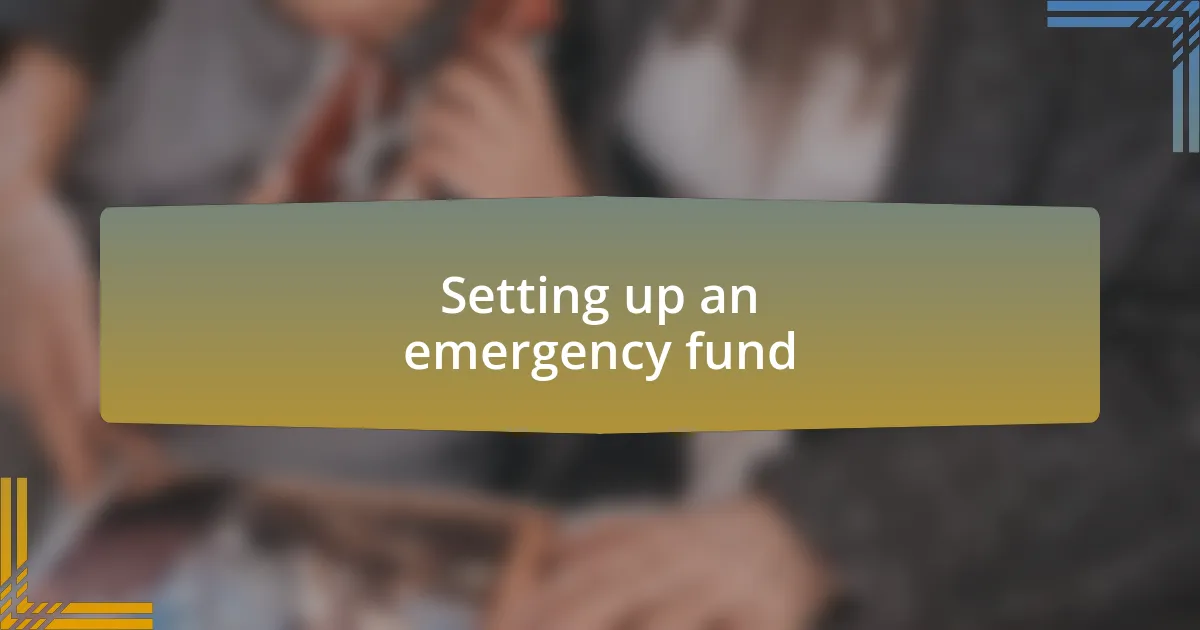
Setting up an emergency fund
Establishing an emergency fund is an essential step in ensuring financial stability, especially during retirement. I recall when I set up my own fund; it provided me with a sense of security that eased my worries about unexpected expenses. Doesn’t that feeling of readiness for the unexpected sound comforting?
Next, it’s crucial to determine how much you’ll need in your emergency fund. Personally, I advise aiming for at least three to six months’ worth of living expenses to cover unforeseen costs. Have you ever considered how much peace of mind that extra financial cushion can bring?
Finally, once you’ve set a target amount, the next step is to create a dedicated savings account. I did this a few years ago, and having that separation made it easier to manage my finances without the temptation to dip into the fund for non-emergencies. Isn’t it nice to know that your emergency savings are just waiting there, ready to give you a hand when life throws a curveball?
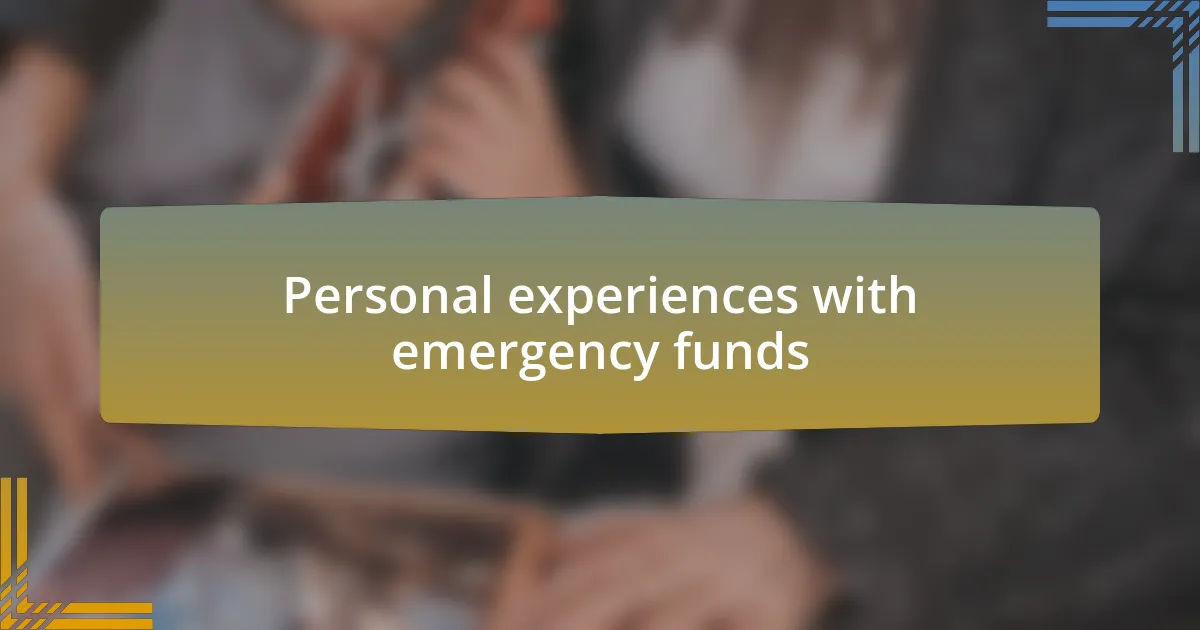
Personal experiences with emergency funds
When I first tapped into my emergency fund, it was surprisingly freeing. I remember the moment vividly—receiving an unexpected bill that would have usually sent me into a panic. Instead, I simply accessed my savings, feeling a wave of relief wash over me. Have you ever experienced the immediate comfort that comes from knowing you’re prepared for surprises?
There was a time when my car broke down unexpectedly, and I found myself reflecting on the importance of that financial cushion. The repair costs were steep, but having my emergency fund saved the day. It reminded me of how essential that fund truly is; without it, I would have been stressed about how to cover the unexpected expense. Isn’t it amazing how one fund can transform your approach to unplanned events?
A few months back, I had the opportunity to travel unexpectedly for a family emergency. Knowing I had my emergency fund gave me the flexibility to focus on what mattered most—supporting my loved ones—without stressing over the financial implications. What if you had that same comfort in similar situations? The reality is that having an emergency fund not only safeguards you financially but also empowers you to prioritize what really matters in life.
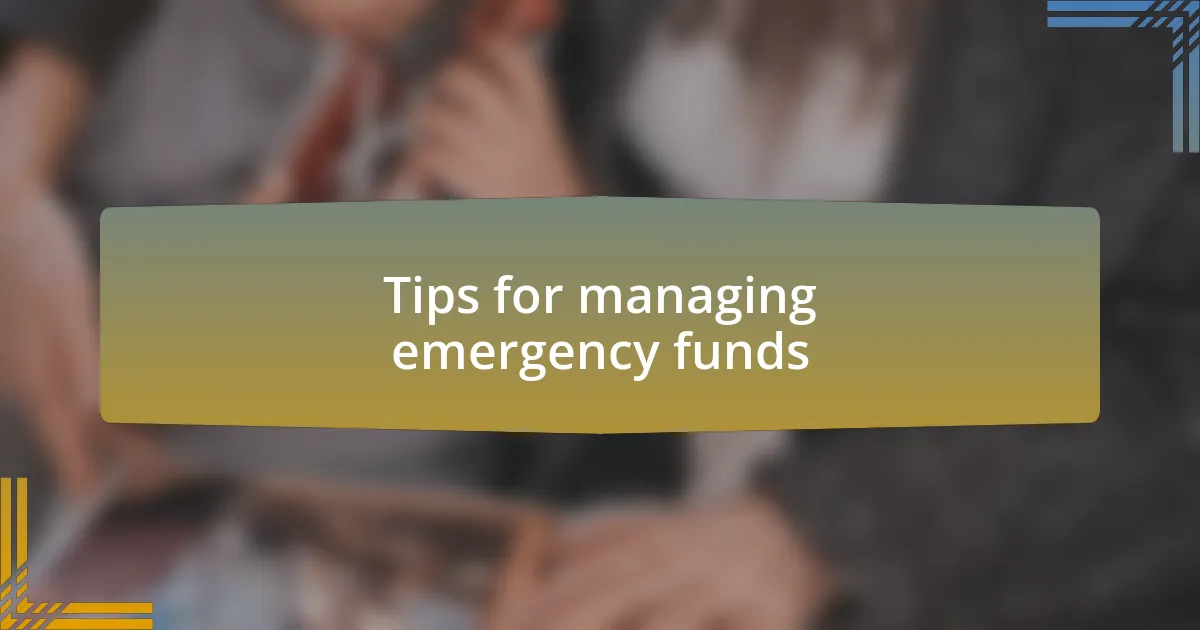
Tips for managing emergency funds
Managing an emergency fund is a balancing act that I’ve come to appreciate deeply. I suggest starting small—perhaps setting aside just a few dollars each week can accumulate quickly. I remember when I first began this practice; it felt like building a safety net, one stitch at a time, until I finally felt secure enough to tackle life’s uncertainties without fear.
One thing I’ve learned is to keep your emergency fund accessible but separate from your regular spending. For instance, I once opened a high-yield savings account specifically for this purpose. It became my little financial fortress, allowing me to earn some interest while ensuring the money was there when I needed it most. Isn’t it reassuring to know your money is working for you, even in a time of need?
Regularly reviewing your emergency fund strategy can also prevent complacency. A few months ago, I realized my fund was slipping below my target amount due to increased living costs. This prompted me to adjust my contributions, ensuring I was always prepared for whatever life throws my way. How often do you take a moment to assess if your financial cushion is still adequate for your current lifestyle?